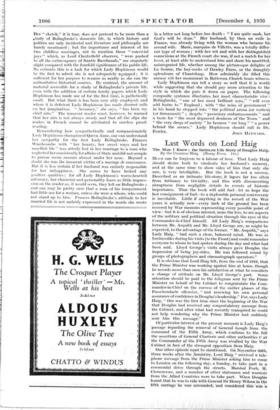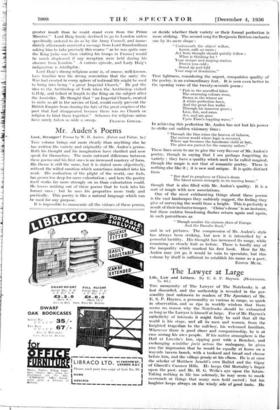The Man I Knew ; the Intimate Life Story of
Douglas Haig. By the Countess Haig. (Moray Press. 18s.)
Last Words on Lord Haig
Mum can be forgiven to a labour of love. That Lady Haig should desire both to vindicate her husband's memory, and at the same time to show sides 'of hini that only she saw, is very intelligible. But the book is not a success. Described as an intimate life-story, it lapses far too often from intimacy to triviality, and flies with disConcerting abruptness from negligible details to events of historic importance. That the book will add fuel—let us hope the last consignment of fuel—to a deplorable personal controversy is inevitable. Little if anything in the record of the War years is actually new—every. inch of . the ground • has been covered by War memoirs representing every -possible point of view—but it is of obvious interest; none the lesa, to See aspects of the military and political situation through the eyes of the Commander-in-Chief himself. All Lady Haig's comparisons between Mr. Asquith and Mr. Lloyd George are, as might be expected, to the advantage of the former. " Mr. Asquith," says Lady Haig, " had such a clear, balanced mind. He was so businesslike during his visits [to the Front] and could remember everyone to whom he had spoken during the day and what had been said. Lloyd George's visits always gave Douglas the impression of being joy-rides. He was followed round by groups of photographers and cinematograph operators."
It is obvious that Lord Haig felt, from the end of 1916, that the Prime Minister was working against him at home, though he records more than once his satisfaction at what he considers a change of attitude on Mr. Lloyd George's part. Sonic attention should be paid to the telegram sent by the Prinie Minister on behalf of the Cabinet to congratulate the Com- mander-in-Chief on the success of the earlier phases of the Passchendaele offensive, " and renewing his own personal assurance of confidence in Douglas's leadership." For, says Lady Haig, " this was the first time since the beginning of the War that Douglas had received any congratulatory message from the Cabinet, and after what had recently transpired he could not help wondering why the Prime Minister had suddenly sent him this message:"
Of particular interest at the present moment is Lady Haig's passage regarding the removal of General Gough from the command of the Fifth Army, which confirms to the full the assertions of General erfarteris and other authorities t! at the Commander of the Fifth Army was recalled by the War Cabinet in fack of the strongest opposition from Haig. '
One "other episode must be mentioned. On November 30th, three weeks after the Armistice, Lord Haig " received a tele- phone message`irom -the Prime Minister asking him to come to London on the following day, a Sunday, to take part in a ceremonial drive through the streets. Marshal Foch, M. Clemenceau, and a number of other statesmen and warriors from the Allied Countries were to take part. When Douglas learnt that he was to ride with General Sir Henry Wilson in the fifth carriage he'-astounded; and considered thiir 'wits a greater insult than he could stand even from the Prime Minister." Lord Haig firmly declined to go to London unless specifically ordered to do so by the Army Council, and imme- diately afterwards received a message from Lord Stamfordtiam asking him to take precisely this course " as he was quite sure the King [who was then visiting his troops in France] would be much displeased if any reception were held during his absence from London." A curious episode, and Lady Haig's indignation is intelligible.
Lord Haig's strong religious sense is, of course; well-known. Less familiar Was his strong conviction that the unity the War had created in every Sphere of national life Might-be used to bring into being " a great Imperial Church." He put the idea to the Archbishop of York when the Archbishop visited G.H.Q., and talked at length to the King on the subject after the Armistice. He thought that " an Imperial Church, created to unite us, all in the service of God, would surely prevent, the British Empire from sharing the fate of the great empires of the past that had disappeared because there was no Church or religion to bind them together." Schemes for religious union have rarely taken so wide a sweep. FRANCIS GOWER.





















































 Previous page
Previous page